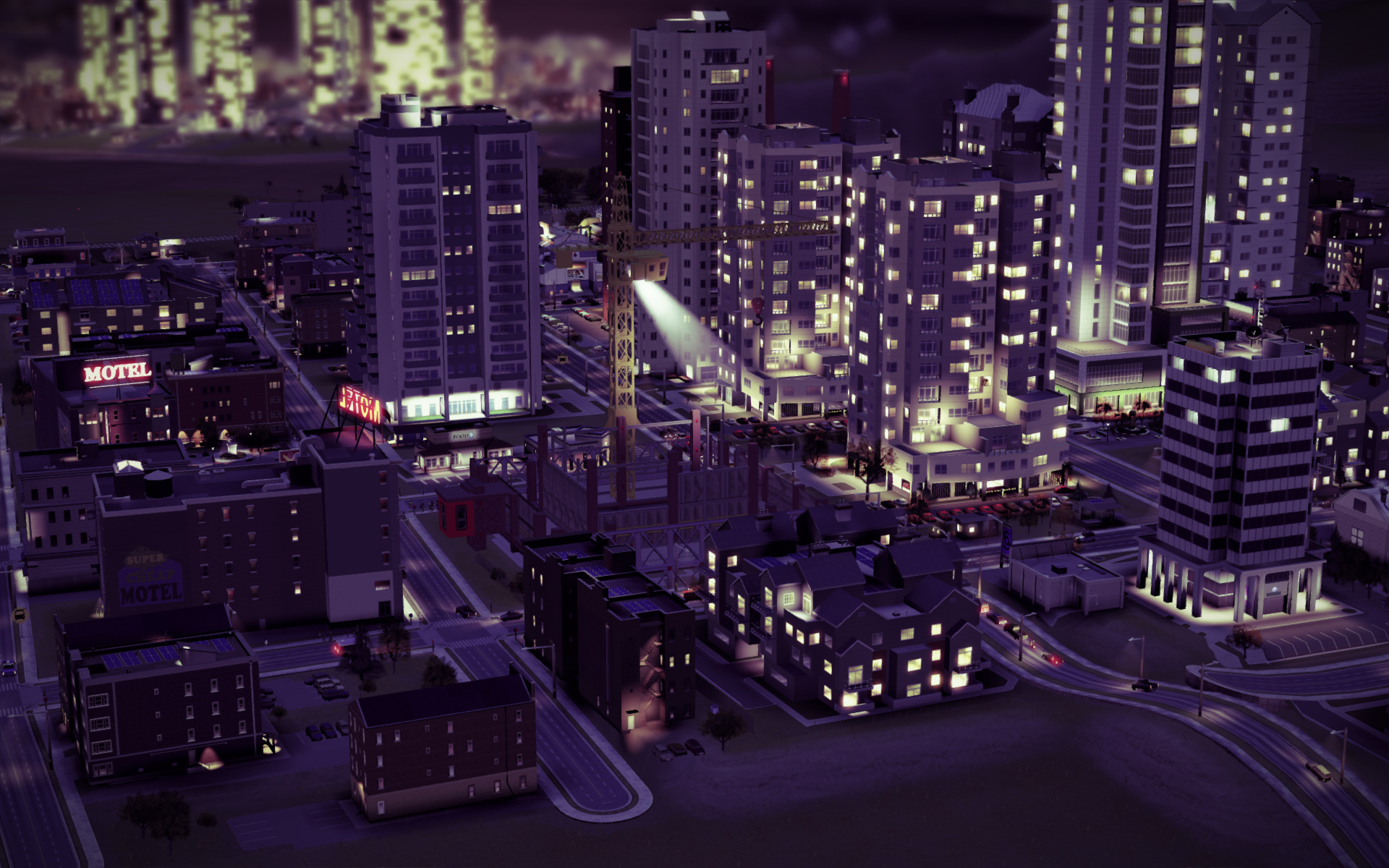Our Verdict
An incredible simulation and a joy to play, SimCity is tragically hobbled by the consequences of its always-online requirement.
PC Gamer's got your back
At their greatest scale, SimCity's cities are self-powering machines with hundreds of thousands of moving parts. They churn through endless feedback loops, feeding Sims into swirling cause and effect eddies that produce money, goods, happiness, and growth. After over a week of building, smashing, and rewiring SimCity's machines to figure out how they work, they still surprise me.
SimCity is the series' greatest technical achievement. Will Wright's 1989 original and every Maxis-developed SimCity that came after are about the same thing: building and simulating cities. SimCity does that too, but with a drastically different method. It shifts the simulation from abstract data-crunching to the visible, real-time interactions of thousands of individual Sims, cars, residences, businesses, factories, and everything else you might find in a city.
The Sims themselves aren't exceptional as individuals—they live out their ant-farm lives with short memories and clockwork brains, behaving like small children motivated only by immediate desires and immediate discomfort. They hate crime, unemployment, pollution (called “germs” for some reason), high taxes, and death. They like parks, schools, and city services. They're dumb as individuals, but when thousands of them need caring for, SimCity balloons into a dazzlingly complex and addictive management game, and it's all beautifully rendered in three-dimensional space, scaling all the way down to blades of grass. And even with all that complexity, the game runs smoothly on mid-range hardware, happy to be Alt-Tabbed in and out of, and rarely crashing.
The joy of planning
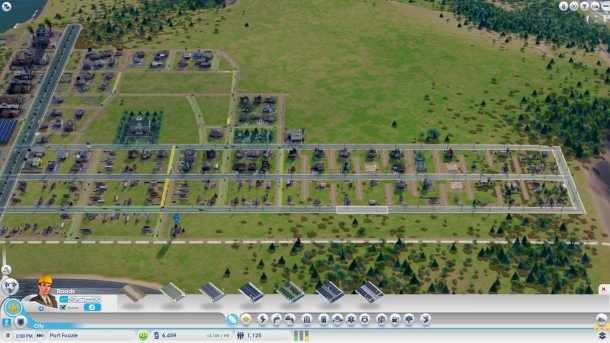
To create a city, I choose a square plot in one of eight region layouts, all of which can be shared with other players or claimed alone. (The regions are attractive and diverse enough to quash my initial pining for the landscape terraforming in previous SimCitys.)
Then, with an empty field and a modest budget, I'm free to build creatively and experiment, pulling out straight and curved roads, as well as zoning residential, commercial, and industrial districts ("RCI" for in-the-know urban planners), and building basic services. It's a joy to seed the empty plot and watch Sims arrive in moving trucks to start their new lives.
If I wanted to play SimCity as a purely sandbox experience—more on that later—it might stay so free and easy, but I can never resist going big. Soon my content small-town Sims will have their dreams crushed by an urban nightmare of unemployment, poison-clogged air, and failing services. For now, however, I can zoom all the way to street level to watch them stroll around my city like windup toys, happy and unaware of the god-like madman peering down at them wielding bulldozers and bad ideas.
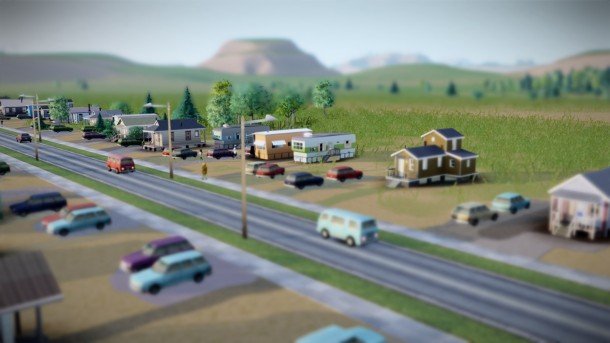
But back to the quiet town. At the macro scale, beautiful data overlays show me subterranean concentrations of water, as well as resources like ore, coal, and oil, which I can exploit when my city is ready for heavy industry. In the beginning, demand for services is low, and how you choose to provide power to your city is the most important decision early in the game.
Coal and oil plants cough out pollution and require resources from mines or the Global Market, an online feature that functions as a commodities exchange enabling players to buy and sell resources. Clean energy solutions—wind and solar plants—also pump power into the city, but require swaths of valuable land to keep the lights on. The type of power plant I choose first will influence the whole narrative of my city, not because I can't switch at any time, but because I refuse to be an inconsistent mayor. Big decisions like this happen at every stage of a city's development, and my choices often influence how I feel about my city more than my city itself.
Close-quarters
The early game is all about anticipating the midgame. As houses become towers, too many intersections and not enough high-capacity avenues will cause traffic gridlocks, and density won't increase at all without enough space. Bigger cities also need more water, more power, more sewage treatment, and more garbage trucks, as well as police, fire, and health coverage, public transportation, parks, and schools.
Buildings can be upgraded, but even upgrades such as extra water pumps and fire truck garages need space. And because service vehicles like fire trucks have to actually drive to where they're needed, seemingly minor details like whether they're more likely to make right or left turns out of their garages really do matter. Getting a handle on such minutiae becomes overwhelming when I try to expand too fast.
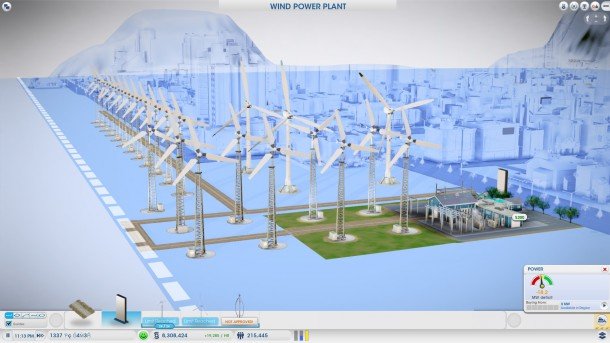
The only way to learn how to plan for and balance all this is trial and error. Even after nearly 100 hours, I'm still discovering new quirks and features of the simulation. Sims sometimes do dumb things, or have unexpected complaints, and identifying and solving these behaviors takes time. Learning through failure is a frustration SimCity gets away with by allowing for failure. There's almost always room to bulldoze half a city, pass a bond measure, and start over. Weirdly, though, SimCity actually seems to encourage failure, making learning more difficult than it has to be.
For instance, the ratio of residential to commercial to industrial zoning has a very small sweet spot, which I like—it's a hard game to master—but SimCity's advisers almost always push me to solve problems by expanding rather than by achieving balance with what I have. Industrial demand is high, even though there are 500 unfilled “low-wealth” jobs (a euphemism that would make any politician proud). Now residential and industrial demand are high. More people! More jobs! Build it all! I don't know what data it's using to inform demand, but it implies I'm doing something wrong even when I'm balancing RCI and optimizing services with the precision and efficiency of an MLG pro. Eventually, I yell back: if you want me to expand so much give me bigger borders, dummy!
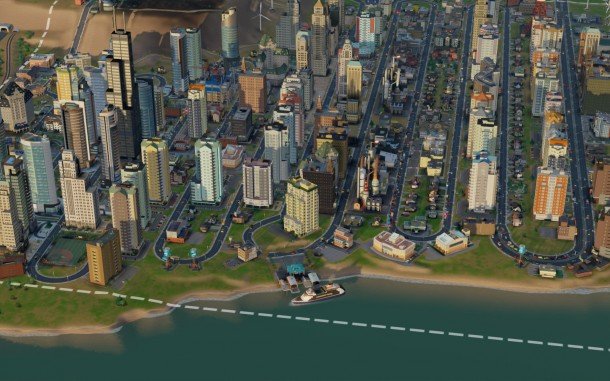
The borders—every city is confined to the same sized square— put a hard limit on how creative you can be when designing high-population cities, but ultimately I like that they force tough trade-offs. Decisions about density, what to build, and how to zone are hard, and trying something, watching it all fall apart, and then rezoning to see what happens is part of the addictive fun. Do I ever wish I could defy the game and pull a road out into the untouched land beyond my dotted line? All the time. I eventually accepted it, though, because if I could solve every problem through expansion, many of the game's challenging trade-offs would be lost.
Sometimes, however, cities fail hard. When services can't handle demand, Sims begin to leave. If too many leave, your income plummets. Now you're losing money, so you turn off services to keep from going broke—but that makes things worse. Now there's no fire or police coverage, and even more Sims are leaving (or, you know, burning to death). And even though population is plummeting, the roads are more clogged than ever. What the hell is happening?
You may never know—cities can become unmanageable at populations over 100,000—and trying to fix things sometimes feels futile. Failed cities are ugly, claustrophobic burdens which require constant attention because they didn't achieve balance early on. Funnily, discarding them is a relief. It's actually an enjoyable part of the game, because all that frustration is replaced by the anticipation of running a new experiment in a pristine new plot. This time I'll get it right, just as long as I pay attention to the hard data more than the advisers or Sims.
Failure to communicate
Sims are really good at communicating what they're unhappy about, so much that it can be annoying, but they're terrible at communicating why they're unhappy about it. They constantly contradict each other: one house is concerned about crime, while its neighbor compliments the neighborhood's great police coverage. One house says shopping is great, the other can't seem to find the stores. Which are across the street. What the hell.
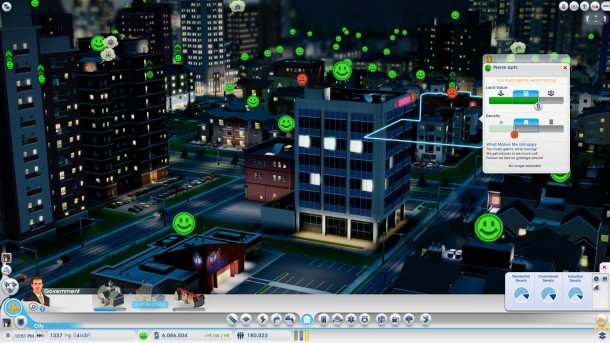
The problem seems to be with what I began this review praising. SimCity isn't run by spreadsheets, it's a simulation of hundreds of thousands of dynamic parts, and I think it's unable to tell me the real reason Sims are unhappy because it doesn't know . If a Sim has money, it will try to find shopping. If it can't find shopping, it will complain. It won't tell me if it sat in a traffic jam all day, or if there are plenty of shops but no medium-wealth Sims to run them, or if it happened to go toward a shop that went under renovation and ceased to be a shop for a short period.
To diagnose problems, I have to ignore the implications of complaints. "Where's the shopping in this town?" suggests I should zone more commercial, but that's not always the case, and my investigation must begin with the roads, the shops themselves, and the people living near them. SimCity is saved by making its data available for study, and by representing every interaction in the world. It's a lot to analyze, but I still wish I knew even more about the simulation so I could make even better informed decisions. For example, how far are Sims willing to travel to shop? Is there a limit? Learning through trial and error can't teach me everything.
Everyone wants to be special
When I'm not worrying about all the things that make my childlike Sims sad, I'm playing an industry mogul and loving it. SimCity's specialization system is great. It adds a layer of challenge on top of RCI zoning, adds to the long-term story of a city, and can make you filthy rich if played right.
"City specialization" is a deceptive term. It implies that you choose one specialization, such as an ore mining town, and run with it. It doesn't work that way—you can select any specialization building from any category, so long as you've unlocked it by meeting a few prerequisites. The buildings enable mining operations, raw materials and consumer goods production, Global Market trade, and the development of a tourism industry.
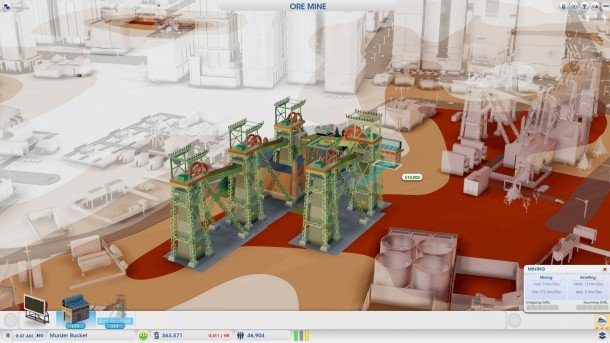
One of my earliest cities, Murder Bucket (it's actually got great police coverage), was rich in ore and oil, so I opted for the dirty job of ripping it all out of the earth. As I pulled ore out of the ground, it needed somewhere to go, so I started building trade depots to sell it on the Global Market. When I reached a certain daily profit, I unlocked the Petroleum HQ, Metals HQ, and Trade HQ. Building and upgrading the headquarters gave me access to new buildings, such as a smelter which produces metal and ore. I was building a complete supply chain, making sure my trucks could get to and from mines, storage facilities, and processing plants. At first, my ambitions caused my city to hemorrhage money, but it was a proud moment when I solved blockages in the chain and started turning a profit.
The specialization system could almost have been its own game, and it adds a wealth of story to every city. As mines and oil wells run dry (resources are not infinite), a trade port enables the purchase of raw materials on the Global Market, so I can stay in the refinery business as an importer/exporter instead of sole producer. Or, I can imagine that when the wells dried up, my sad sack Sims turned to booze and gambling. Or maybe the city reinvents itself, investing in cultural landmarks and high-tech industry. I construct a personal story for every city I build, and specializations add context and detail, making my city's past as important as its future.
County administration
A successful city can't be successful at everything, however, so it must live in symbiosis with the whole region, some of which can house up to 16 cities. If I lack power or water, I can buy it from another city, and if I see that a city in my region can't handle all its garbage, I can volunteer some of my trucks to help. There are also passive benefits. If I have no schools, my population will head to other cities for education. If I have a surplus of low-wealth jobs, unemployed low-wealth residents in other cities will hop on my municipal buses and add to my labor force.
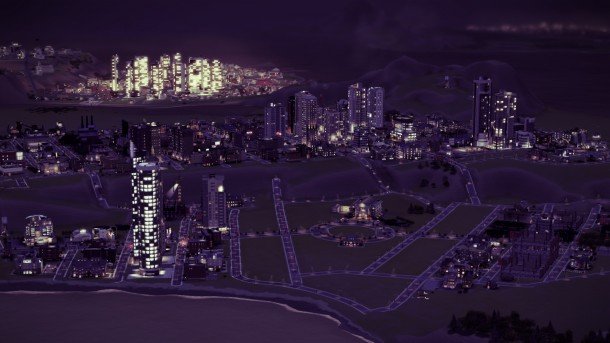
The idea is exciting, but it can be difficult to exploit meaningfully. It's missing information I need, such as what data influences whether or not Sims will commute to other cities, or what the limit on resource sharing is. I can buy power when I need a little extra, but trying to run a city without its own power plants doesn't work. I wasn't being cheeky or trying to test the simulation, I just thought it would be neat to have a dirty city dedicated to coal power supporting a larger, medium-income residential city. I tried: I built a city with a 250 megawatt power surplus to support another, but my powerless city refused to purchase more than 20.8 megawatts despite having a huge power deficit. Why limit how I exploit regional interactions, especially when it's supposed to be the answer to small city sizes?
Multiplayer also makes things tricky, because if I'm just supplementing power with surplus from a friend's city, I've got to yell at them every time their surplus dips. And it will dip—they aren't going to be watching it every second as their city grows.
Passive benefits sometimes confuse me too. When one of my cities needed more low-wealth workers, I founded a new city nearby and filled it with low-wealth residential. I tried not to include too much industry, instead focusing on region-wide public transportation, but it didn't work. The suburban city wouldn't grow like I hoped and was losing money, so I started building up the commercial sector. That got shoppers in from my first city, but I still hadn't solved the worker shortage.
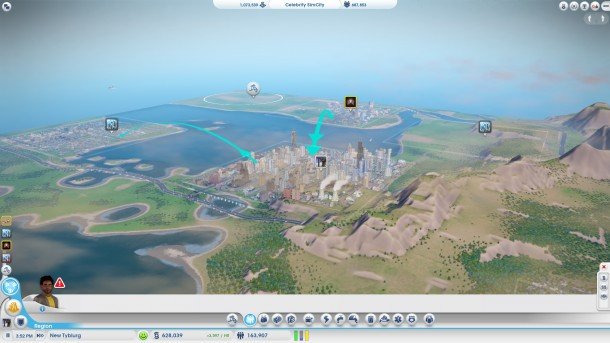
City interaction works in general—I can see that workers sometimes commute, as do shoppers and students—but it can be hard to create intentional symbiosis, except with the simplest shared benefits. City hall upgrades, for example, unlock new building types for the entire region, and if I'm out of space to dump garbage, another city can send a specific number of garbage trucks to help. The hardest part of it is learning to not try to solve everything in one city. There just isn't enough room to be everything, so I have to avoid the temptation to try for a high-tech mining town and electronics producer.
That is, unless I'm playing in Sandbox Mode, which starts you off with 1,000,000 Simoleans and every building unlocked. It's a great place to experiment or just amuse myself with absurd cities. Only circular roads? Why not!
Server, there's a bug in my soup
To play in any region, multiplayer or alone, SimCity requires a constant server connection. Despite Maxis' design justifications, let's face it—it's always-online DRM. SimCity is not an MMO. Having a constant connection to the developing cities in my region is fun, but no more than than a smidgen of SimCity's total fun relies on multiplayer.
And at the time of writing, the always-online requirement is terribly flawed. I've been able to play on the live servers for a total of 50 hours, so it isn't nearly unplayable, but it is very frustrating. I've been stuck in the launcher for 20 minute wait periods to connect to a server, only to have the timer reset after the connection fails. I've made it past the launcher to the menu, only to be told it still can't connect. I've been kicked out of my cities, only to come back to find that they can't be loaded "at this time"—often meaning an hour or more.
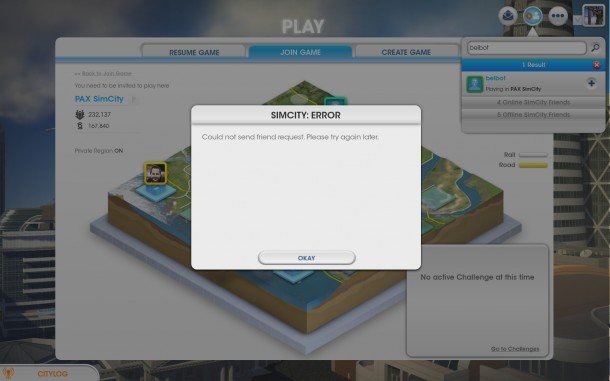
I might have been able to play on a different server—the Oceanic server has been more welcoming—but that's not where my friends and cities are. Starting new cities is plenty fun, but if I can get anything positive out of the always-online requirement, it should be playing with my friends. That was a challenge. Even when the server let me in, adding friends took hours, and invites to join my private region either failed on the spot, or claimed success but still required multiple attempts.
At the time of this writing, Cheetah Speed—the fastest the simulation can run—has been disabled to help reduce the server load. That's a very significant gameplay feature, and that it has been yanked for the time being to deal with service issues is an indication of the magnitude of the server problems.
There are also bugs and poorly-streamlined features. Sims will sometimes refuse to build on certain streets until I bulldoze part of them and rebuild them. Buildings have appeared on top of other buildings. Zones sometimes stack on top of each other. Feature-wise, disasters are fun to watch, but in big cities the bulldoze tool—which is necessary for clearing rubble—is an annoying hassle. Finding all the little burnt-up houses, orienting the camera, and clicking on them is needless busy work.
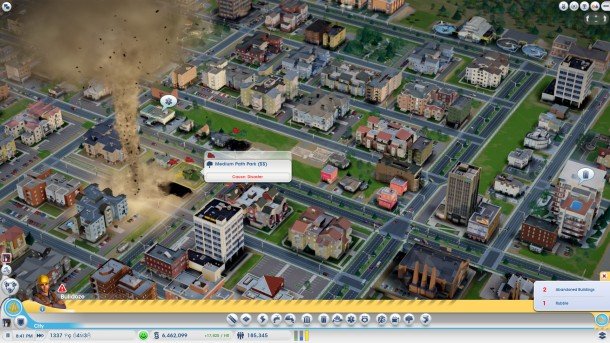
The launch day rush is a unique situation, and I think it's fair to assume service will improve and patches will fix bugs and improve features. Even so, the always-online requirement is a long-term issue. It means it's up to EA when we can and can't play the game we bought. It removes the game from ideal playing situations, like on planes or wherever shoddy WiFi exists. It prevents reverting to a previous save when things go wrong, and I've desperately, fruitlessly hit Ctrl-Z after some of my mistakes. It prevents modding, which could add so much value to a game like SimCity over time. Imagine if modders were able to tweak the Sims' flowchart logic, or add new building types and looks. What insane scenarios would be unleashed? We'll probably never know.
Worst of all, the always-online requirement might even prevent us from playing SimCity at all one day, if the servers are ever retired.
What might still be
SimCity 2000 is 16-years-old and still being played. It's a legend, and SimCity has the capacity to achieve the same longevity. Despite the quirky Sim behavior and communication failures, and despite the bugs and always-online requirement, I'm still barely able to pull myself away from it at 3 a.m. It's a fascinating game to study, and a joy to play.
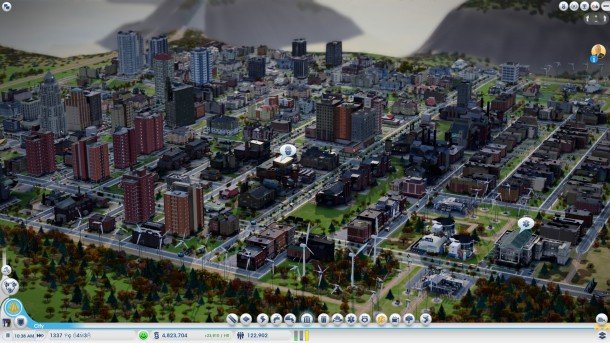
Just watching SimCity work is amazing. I can watch the shadows cast by charmingly archetypal apartment buildings and factories creep along the ground as the sun sets. I can zoom in to watch my residents' lives, knowing they're all going somewhere and doing something, even if they don't know why. As a simulation of a real city, it doesn't seem especially accurate, but I don't play to become an urban planner. I play to build machines, to test hypotheses, to examine vexing behaviors and solve micro and macro problems—and to tell a story.
As a simulator, SimCity advances the achievements of SimCity 4, SimCity 3000, and SimCity 2000, but as a product, it is inferior to all of them. Constant connectivity does have benefits, such as leaderboards, worldwide challenges, and the Global Market, but it's not even close to being worth the hassle for those features, and hardly touches the essence of what makes SimCity so diabolically addictive and engrossing. If Maxis and EA would just loosen their grip on the idea that the game requires constant social interaction—a feature that also happens to function as an anti-piracy measure—and we're one day given the option to run local servers, SimCity could still become the legendary series rebirth it was intended to be.
An incredible simulation and a joy to play, SimCity is tragically hobbled by the consequences of its always-online requirement.

Tyler grew up in Silicon Valley during the '80s and '90s, playing games like Zork and Arkanoid on early PCs. He was later captivated by Myst, SimCity, Civilization, Command & Conquer, all the shooters they call "boomer shooters" now, and PS1 classic Bushido Blade (that's right: he had Bleem!). Tyler joined PC Gamer in 2011, and today he's focused on the site's news coverage. His hobbies include amateur boxing and adding to his 1,200-plus hours in Rocket League.
